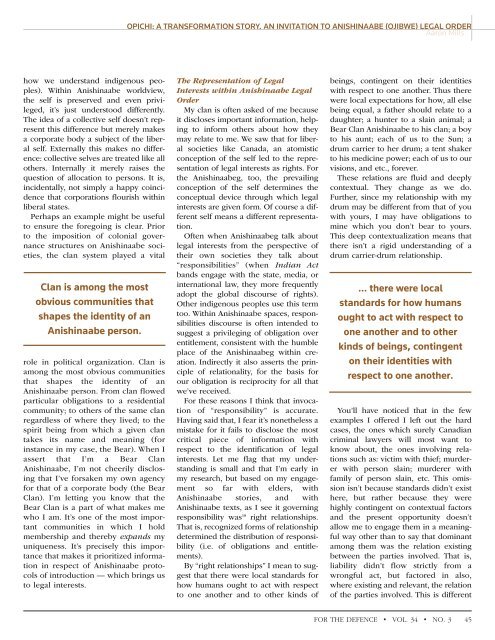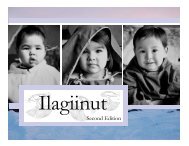FTD_Vol34_No3_web
FTD_Vol34_No3_web
FTD_Vol34_No3_web
You also want an ePaper? Increase the reach of your titles
YUMPU automatically turns print PDFs into web optimized ePapers that Google loves.
For the Defence_34-3_Layout 1 13-08-16 10:41 AM Page 45<br />
OPICHI: A TRANSFORMATION STORY, AN INVITATION TO ANISHINAABE (OJIBWE) LEGAL ORDER<br />
how we understand indigenous peoples).<br />
Within Anishinaabe worldview,<br />
the self is preserved and even privileged,<br />
it’s just understood differently.<br />
The idea of a collective self doesn’t represent<br />
this difference but merely makes<br />
a corporate body a subject of the liberal<br />
self. Externally this makes no difference:<br />
collective selves are treated like all<br />
others. Internally it merely raises the<br />
question of allocation to persons. It is,<br />
incidentally, not simply a happy coincidence<br />
that corporations flourish within<br />
liberal states.<br />
Perhaps an example might be useful<br />
to ensure the foregoing is clear. Prior<br />
to the imposition of colonial governance<br />
structures on Anishinaabe societies,<br />
the clan system played a vital<br />
Clan is among the most<br />
obvious communities that<br />
shapes the identity of an<br />
Anishinaabe person.<br />
role in political organization. Clan is<br />
among the most obvious communities<br />
that shapes the identity of an<br />
Anishinaabe person. From clan flowed<br />
particular obligations to a residential<br />
community; to others of the same clan<br />
regardless of where they lived; to the<br />
spirit being from which a given clan<br />
takes its name and meaning (for<br />
instance in my case, the Bear). When I<br />
assert that I’m a Bear Clan<br />
Anishinaabe, I’m not cheerily disclosing<br />
that I’ve forsaken my own agency<br />
for that of a corporate body (the Bear<br />
Clan). I’m letting you know that the<br />
Bear Clan is a part of what makes me<br />
who I am. It’s one of the most important<br />
communities in which I hold<br />
membership and thereby expands my<br />
uniqueness. It’s precisely this importance<br />
that makes it prioritized information<br />
in respect of Anishinaabe protocols<br />
of introduction — which brings us<br />
to legal interests.<br />
The Representation of Legal<br />
Interests within Anishinaabe Legal<br />
Order<br />
My clan is often asked of me because<br />
it discloses important information, helping<br />
to inform others about how they<br />
may relate to me. We saw that for liberal<br />
societies like Canada, an atomistic<br />
conception of the self led to the representation<br />
of legal interests as rights. For<br />
the Anishinaabeg, too, the prevailing<br />
conception of the self determines the<br />
conceptual device through which legal<br />
interests are given form. Of course a different<br />
self means a different representation.<br />
Often when Anishinaabeg talk about<br />
legal interests from the perspective of<br />
their own societies they talk about<br />
“responsibilities” (when Indian Act<br />
bands engage with the state, media, or<br />
international law, they more frequently<br />
adopt the global discourse of rights).<br />
Other indigenous peoples use this term<br />
too. Within Anishinaabe spaces, responsibilities<br />
discourse is often intended to<br />
suggest a privileging of obligation over<br />
entitlement, consistent with the humble<br />
place of the Anishinaabeg within creation.<br />
Indirectly it also asserts the principle<br />
of relationality, for the basis for<br />
our obligation is reciprocity for all that<br />
we’ve received.<br />
For these reasons I think that invocation<br />
of “responsibility” is accurate.<br />
Having said that, I fear it’s nonetheless a<br />
mistake for it fails to disclose the most<br />
critical piece of information with<br />
respect to the identification of legal<br />
interests. Let me flag that my understanding<br />
is small and that I’m early in<br />
my research, but based on my engagement<br />
so far with elders, with<br />
Anishinaabe stories, and with<br />
Anishinaabe texts, as I see it governing<br />
responsibility was 18 right relationships.<br />
That is, recognized forms of relationship<br />
determined the distribution of responsibility<br />
(i.e. of obligations and entitlements).<br />
By “right relationships” I mean to suggest<br />
that there were local standards for<br />
how humans ought to act with respect<br />
to one another and to other kinds of<br />
beings, contingent on their identities<br />
with respect to one another. Thus there<br />
were local expectations for how, all else<br />
being equal, a father should relate to a<br />
daughter; a hunter to a slain animal; a<br />
Bear Clan Anishinaabe to his clan; a boy<br />
to his aunt; each of us to the Sun; a<br />
drum carrier to her drum; a tent shaker<br />
to his medicine power; each of us to our<br />
visions, and etc., forever.<br />
These relations are fluid and deeply<br />
contextual. They change as we do.<br />
Further, since my relationship with my<br />
drum may be different from that of you<br />
with yours, I may have obligations to<br />
mine which you don’t bear to yours.<br />
This deep contextualization means that<br />
there isn’t a rigid understanding of a<br />
drum carrier-drum relationship.<br />
... there were local<br />
standards for how humans<br />
ought to act with respect to<br />
one another and to other<br />
kinds of beings, contingent<br />
on their identities with<br />
respect to one another.<br />
You’ll have noticed that in the few<br />
examples I offered I left out the hard<br />
cases, the ones which surely Canadian<br />
criminal lawyers will most want to<br />
know about, the ones involving relations<br />
such as: victim with thief; murderer<br />
with person slain; murderer with<br />
family of person slain, etc. This omission<br />
isn’t because standards didn’t exist<br />
here, but rather because they were<br />
highly contingent on contextual factors<br />
and the present opportunity doesn’t<br />
allow me to engage them in a meaningful<br />
way other than to say that dominant<br />
among them was the relation existing<br />
between the parties involved. That is,<br />
liability didn’t flow strictly from a<br />
wrongful act, but factored in also,<br />
where existing and relevant, the relation<br />
of the parties involved. This is different<br />
FOR THE DEFENCE • VOL. 34 • NO. 3<br />
45



